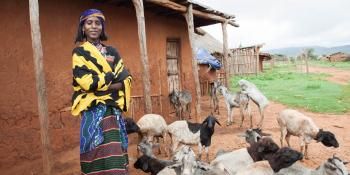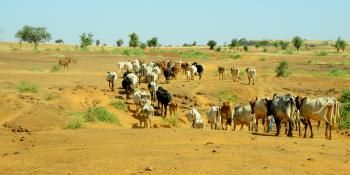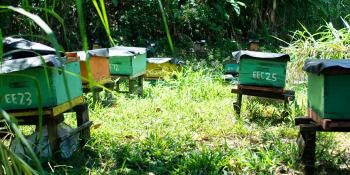East Africa Scenarios Workshop 2: Refining Regional Scenarios
Workshop Objectives
- To refine a draft set of four East African Scenarios based on the work done at and since the first workshop (Nairobi, 24-26 August 2010)
- To agree a set of ~9 main synergy/tradeoff variables for Food Security, Environment and Livelihoods (FSEL) (~3 for each) of interest to CCAFS
- To identify synergies and trade-offs between FSEL variables for each scenario
- To plan follow-up activities
| ||
 |  |
|
Workshop Objectives
- To refine a draft set of four East African Scenarios based on the work done at and since the first workshop (Nairobi, 24-26 August 2010)
- To agree a set of ~9 main synergy/tradeoff variables for Food Security, Environment and Livelihoods (FSEL) (~3 for each) of interest to CCAFS
- To identify synergies and trade-offs between FSEL variables for each scenario
- To plan follow-up activities
Anticipated Outputs
- A draft set of four plausible, internally coherent and discrete East African Scenarios
- A set of FSEL variables of interest for analysis of synergies/tradeoffs
- An initial analysis of how each FSEL variable would change for each scenario (plotted on spider diagrams)
- Plans for follow-up activities
Tuesday 5 October
Opening and Review of Progress (Chair: John Ingram)
- Welcome and introduction to the workshop (John Ingram)
- Welcome to Dar es Salaam and introduction to START (Pius Yanda)
- Self Introductions (All)
- Re-introducing the CCAFS scenario exercise and review of progress made in Workshop One in developing scenarios for East Africa
- Discussion (Andrew Ainslie)
East African Narratives (Chair: Andrew Ainslie)
- Presentations of main points of 4 initial Narratives (10 mins each)
- Discussion
- Scenarios Groups discussions to check internal consistency of Narratives
Wednesday 6 October
Session 1
Plans for the day and what we aim to achieve (John Ingram)
East African Narratives (continued) (Chair: Andrew Ainslie)
- Presentations of revisions to Narratives (15 mins each)
- Discussion
Session 2
- Introduction to FSEL variables; notion of synergies and tradeoffs (Polly Ericksen)
- Discussion
- Group discussions (3 groups; different mix to Scenarios Groups) to identify FSEL variables of interest to CCAFS
Session 3
Report back and distillation of ~9 FSEL variable for identifying synergies/tradeoffs (for spider axes) (Polly Ericksen to lead)
Session 4
Scenarios Groups discussions to check narratives can ‘accommodate’ agreed FSEL variables
Thursday 7 October
Session 1
- Introduction and Charge to Groups (Polly Ericksen)
- Scenario Groups discussions to describe changes (give 3-4 examples of changes that are likely to affect each variable)
b. Assessing changes in FSEL variables
- Introduction and Charge to Groups (John Ingram)
- Scenario Groups discussions to systematically assess changes (assign ++, +, 0, -, -- for each FSEL variable)
c. Analysing synergies/tradeoffs
Report back and plot changes in FSEL variables
Session 4
Discussion on outcomes of the exercise
Follow-up activities in the region (Chair: John Ingram)
- Plans for refining scenarios narratives, formatting output, reporting
- Plans for follow-up activities in the region: quantitative modelling and links to CCAFS Themes – 2011 activities
Outputs
“4 Steps to Building East African Scenarios” (PDF)
Report on CCAFS Regional Scenarios Development for East Africa (PDF)




